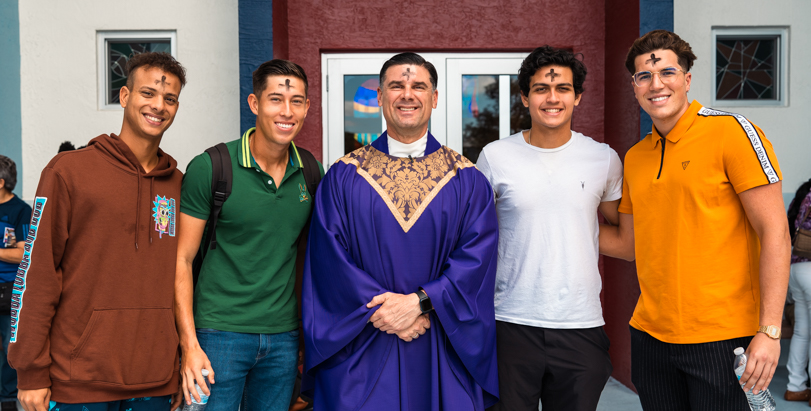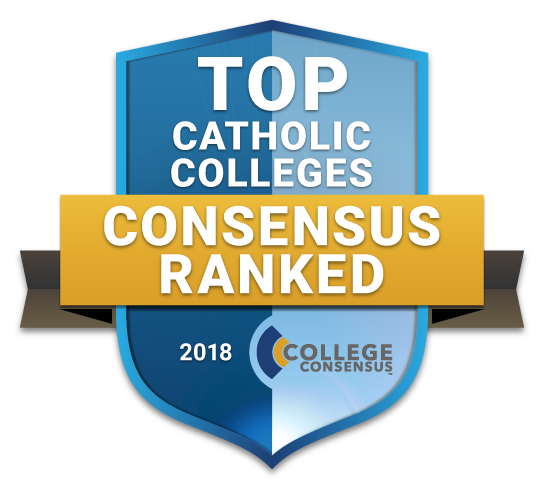
Catholic Identity Statement
Born from the heart of the Church, a Catholic university is located in that course of tradition which may be traced back to the very origin of the university as an institution. It has always been recognized as an incomparable center of creativity and dissemination of knowledge for the good of humanity.
An authentic faith – which is never comfortable or completely personal – always involves a deep desire to change the world, to transmit values, to leave this earth somehow better than we found it. We love this magnificent planet on which God has put us, and we love the human family which dwells here, with all its tragedies and struggles, its hopes and aspirations, its strengths and weaknesses. The earth is our common home and all of us are brothers and sisters.
St. Thomas is a Catholic university with rich cultural and international diversity committed to the academic and professional success of its students who become ethical leaders in our global community.
St. Thomas University Mission Statement
What does it mean that St. Thomas University is a Catholic university?
The word “catholic” comes from two Greek words: kata (with respect to) and holos (whole), so we are catholic when we show respect for the whole, for everything and everyone. Catholic is often defined as “universal”, a genuine concern for all of God’s people and creation. Our university is a forming community of co-learners that teaches and worships in the Catholic tradition, and that makes actions on behalf of justice, mercy, forgiveness, peace, and love constitutive of our identity (St. Thomas University Catholic Identity Statement, 1990).
A university is a place of teaching and learning, research, and service to the world. It is a place where learning happens – in the classroom, on the field, in the residence halls, in the community, and in the chapel.
We are a Catholic university because we seek truth through the intellectual life, because we want to be a transformative presence in the world.
We are a Catholic university because we seek to infuse the world with compassion and faith, animated by the spirit of Christ (Ex Corde 21).
We are a Catholic university because we ground our work in the hope to be found in the Eucharist, the source and summit of Catholic belief and practice.
As a Catholic university, we actively engage ever-widening circles of relationship and responsibility, beginning with each person’s own spirit and moving out. While teaching intellectual and practical skills, we initiate our students into personal, social, spiritual, and ecological relationships that make values visible in the wider culture.
We value relationships that are reflected in who we read, who we talk with, how we care, what we think, how we judge, how we act, what we see, and where we go.
We believe relationships require conversation, time, respect, deep care and mindfulness.
We believe relationships can be transformative, calling us to be all that God created us to be.
We value transformative relationships
- with your spirit.
- with the Church.
- between faith and reason.
- with humanity.
- with the poor and disenfranchised.
- with the earth.
We live out our Catholic identity in these ways:
With your spirit.
St. Thomas University offers many opportunities to renew and feed your spiritual life.
Campus Ministry offers retreat experiences, faith sharing groups, Bible study, and other ways to grow spiritually. The beautiful Chapel of Saint Anthony, anchoring the geographic center of our campus, is open every day for quiet prayer and reflection in addition to gathering the community for daily Mass. There are many special events held on campus, with guest lecturers, as well as retreat formats, to enhance one’s spiritual growth and development.
With the Church.
St. Thomas University has a rich history of relationship with the Church. It was founded by the Augustinian order in Havana, Cuba, as Universidad de Santo Tomas de Villanueva and found itself in exile in 1961 when the order and faculty were expelled from Cuba. It remained under Augustinian sponsorship until the late 1980’s, when the sponsorship was assumed by the Archdiocese of Miami. St. Thomas University is the Archdiocesan university of the Archdiocese of Miami. We are one of only eleven Catholic universities that are directly associated with the local diocese or archdiocese of the Church, a connection we hold dear. Over the past fifty years, we have formed deep relationships with local parishes and local churches, as well as with the Catholic school system in the Archdiocese of Miami.
Between faith and reason.
St. Thomas University strives to be a place which “brings to its task the inspiration and light of the Christian message….a place of research, where scholars scrutinize reality with the methods proper to each academic discipline, and so contribute to the treasury of human knowledge. (Ex Corde 14,15) As a Catholic university, we take seriously the God-given gift of the intellectual life. This grounding in the Catholic intellectual and artistic heritage is evidenced by excellent faculty across disciplines, a focus on student success, and a General Education core at the undergraduate level that seeks to prepare students for critical engagement of students in the important issues of the world not as observers, but as leaders. The General Education requirements include courses in religious studies, philosophy, and Catholic identity, as well as courses across the disciplines with an emphasis on critical thinking skills that should well equip students for such engagement.
The graduate programs at St. Thomas University prepare students for ethical leadership across disciplines as well, including the St. Thomas University School of Law and our Doctoral programs. Graduates leave with increased knowledge, a commitment to lifelong learning, a sense of moral responsibility, and a readiness to contribute to society with compassion and faith. (STU Mission Statement 1990)
With humanity.
St. Thomas University values our relationships with all whom we encounter, holding the dignity of the human person, uniquely made in the image and likeness of God, as sacred. “Human persons are willed by God; they are imprinted with God’s image. Their dignity does not come from the work they do, but from the persons they are.” (Centesimus annus, 11). The challenge to live in such sacred relationship with all people, regardless of race, gender, socioeconomic class, religious practices, and other forms of diversity is a challenge that we take seriously, to reverence all of life. But it is a challenge. Pope Francis writes: “True wisdom, as the fruit of self-examination, dialogue and generous encounter between persons, is not acquired by a mere accumulation of data which eventually leads to overload and confusion, a sort of mental pollution…Today’s media do enable us to communicate and to share our knowledge and affections. Yet at times they also shield us from direct contact with the pain, the fears and the joys of others and the complexity of their personal experiences. (Laudato Si’ 47) We embrace the challenge to uphold human dignity in the contemporary world at St. Thomas University.
With the poor and disenfranchised.
St. Thomas University has a commitment to engage the contemporary issues of our time, and in a particular way, engagement with those who are poor and marginalized. “The joys and the hopes, the griefs and the anxieties of the people of this age, especially those who are poor or in any way afflicted, these are the joys and hopes, the griefs and anxieties of the followers of Christ.” (Gaudium et Spes, 1) Ex Corde calls the Catholic university “to seek to discover the roots and causes of the serious problems of our time, paying special attention to their ethical and religious dimensions.” (32) The Center for Community Engagement offers students at every level the possibility of relationship with local justice issues especially in the Miami Gardens community, with regional farmworker issues, and with global justice issues through our sustained development work with Port de Paix, Haiti.
With the earth.
St. Thomas University is a beautiful campus, where attention to the natural environment has long been a priority, both in practical ways of caring for the campus and its buildings, and in the writing and research on environmental issues by faculty of the main campus and School of Law. As a Catholic university, we are called to care and be responsible for the earth and all that is living. Pope Francis calls us to a relationship with the earth and education to prepare for that relationship. “Environmental education has broadened its goals. Whereas in the beginning it was mainly centered on scientific information, consciousness-raising and the prevention of environmental risks, it tends now to include a critique of the “myths” of a modernity grounded in a utilitarian mindset (individualism, unlimited progress, competition, consumerism, the unregulated market). It seeks also to restore the various levels of ecological equilibrium, establishing harmony within ourselves, with others, with nature and other living creatures, and with God.” (Laudato Si’ 210)
It takes all of us to live these transformative relationships into reality, to make St. Thomas University a truly Catholic university!


